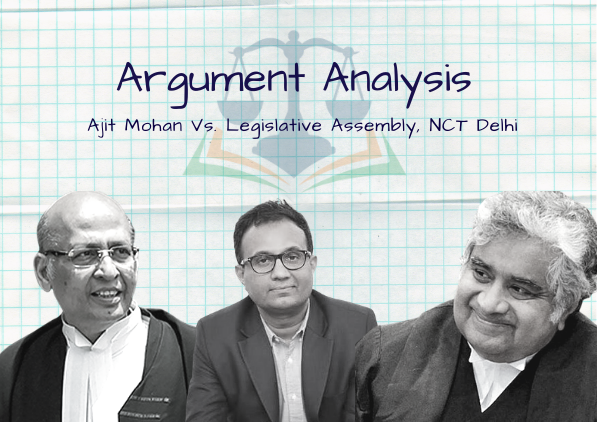Argument Analysis: Facebook's MD, Ajit Mohan's Challenge To Issuance Of Delhi Assembly Summons In Supreme Court

The Supreme Court continued hearing arguments in M.D. & Vice President of Facebook India, Ajit Mohan's plea challenging the Delhi Assembly's summons.
The hearing started with Dr Singhvi continuing his submissions that he could not conclude on February 3, 2021, due to internet connection issues at Justice Kaul's residence.
Dr Singhvi began his submissions by referring to the concept of federalism and after that relied on important judgements of the legislative powers of Delhi Assembly and Article 239AA of the Constitution of India,1950.
At this juncture, Justice SK Kaul intervened and said, "Ultimately the issue will be that these are the two entries in question and question of federalism, they are nice words and adjectives. But the point is whether the entries cover these issues or not, and if yes, how can they be reconciled."
Answering to Justice SK Kaul's question, Dr Singhvi elaborated on various entries under schedule 7 such as entry 39 list 2, entry one and entry 2 lists 3 that are applicable on the Peace and Harmony Committee of the Delhi Legislative Assembly.
At this juncture, Justice Dinesh Maheshwari asked Dr Singhvi if he was correlating the Peace and Harmony Committee subject that was constituted by March 2, 2020, to any of the entries of the Concurrent List or List 2.
Justice SK Kaul: Dr Singhvi, Entry 39 is power, but power must be co-relatable to subject so entry 39 facilitates them to do all that any other assembly is liable to do.
Dr Singhvi: This subject matter, the process of collecting this information & discussing this subject is found in many entries together including Entry 39 List 2, Entry 1, 2 & 45 List 3.
He also informed the Bench about the issuance of a new notice that has been mailed and posted to the petitioners.
While making his submissions, Singhvi elaborated on Article 105 (2) and (4) of India's Constitution. He relied on various relevant paragraphs of the Supreme Court's Constitution Bench Judgement of Kalpana Mehta v. Union of India & Ors (2018) 7 SCC 1. Further, Singhvi also referred to the relevant paragraphs of Practice and Procedure of Parliament by MN Kaul and SL Shakhdar to substantiate his point of petitioners forgetting the principles that form the heart of Parliamentary democracy.
"Whether the assembly has the jurisdiction to rule on the subject? This is the question which is of consideration", Justice SK Kaul asked Dr Singhvi.
Justice Hrishikesh Roy: Dr Singhvhi I think it was projected as a jurisdictional issue. That is how the petitioners presented the case.
Dr Singhvi answering the questions posed by the Judges: The argument of jurisdiction sustains but the argument of privilege put forward by the petitioners is irrelevant
Singhvi further submitted that the arguments put forward by the petitioners is a red hearing of an argument and substantiated his submission by stating that the argument concerning privilege was superfluous. He also contended that there is no need for the Bench to be subjected to so much wisdom.
"My submission is you are mixing it with privilege because then it stands at a very high pedestal. Your Lordships should then reconsider some judgements, refer it to nine judges. That's why I say with utmost respect Red Hearing. It doesn't help your Lordships or assist your Lordships in holding in favour of me or against me", Singhvi further argued.
Singhvi to substantiate his contentions on the Power of the Committees of the Delhi Legislative Assembly's to summon and enforce attendance elaborated on the Assemblies' Powers in common law jurisdictions as UK, Canada, South Africa, Australia and USA.
The next major submission made by Dr Singhvi was that the petitioner's commercial exigency to choose the committee before which he wants to appear and before which he does not want to appear is an answer that cannot be accepted in law.
At this juncture, Justice SK Kaul intervened and said, "Let us say for the sake of argument that the petitioner does not want to attend. Then we don't need to go into the issue. As I have repeatedly been saying, if you have the power, you can call and do everything you want. You don't have the power; you cannot."
Concerning the petitioner's argument of Assembly Committee being incompetent to summon non-official witnesses Singhvi submitted, there is a fundamental anomaly and conceptual fallacy in the argument's structure. He further contended that there had been no case now that a Parliamentary Committee can call outsiders but an Assembly Committee cannot. He also informed the court about the various petitioner's presence in front of the Parliamentary Committee.
The hearing for February 4, 2021, concluded with Dr Singhvi saying that "The conduct of the petitioner's pattern to appear before select committees is consistent with the pattern of pick and choose. It is an insult to institutions of India."
The matter is now listed for February 9, 2021, to conclude submissions by Dr Singhvi.
Read Arguments advanced on February 3, 2021
Read Arguments advanced on February 2, 2021
